Padi nitrox - Study guides, Class notes & Summaries
Looking for the best study guides, study notes and summaries about Padi nitrox? On this page you'll find 31 study documents about Padi nitrox.
Page 3 out of 31 results
Sort by
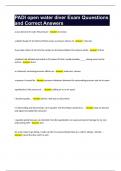
-
PADI open water diver Exam Quuestions and Correct Answers
- Exam (elaborations) • 5 pages • 2024
- Available in package deal
-
- $13.49
- + learn more
PADI open water diver Exam Quuestions and Correct Answers as you descend in water the pressure - Answer: increases a depth change of 10 meters/33 feet causes a pressure chance of - Answer: 1 bar/ata if you take 6 liters of air from the surface to 20 meters/66feet, the volume will be - Answer: 2 litres a balloon fully inflated and sealed at 10 meters/33 feet, would probably _____ during ascent to the surface - Answer: burst as I descend, increasing pressure affects my - Answer: mas...
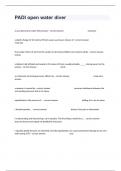
-
PADI open water diver Complete Questions And 100% Verified Answers Guaranteed Success.
- Exam (elaborations) • 6 pages • 2024
-
Available in package deal
-
- $12.99
- + learn more
as you descend in water the pressure - correct answer increases a depth change of 10 meters/33 feet causes a pressure chance of - correct answer 1 bar/ata if you take 6 liters of air from the surface to 20 meters/66feet, the volume will be - correct answer 2 litres a balloon fully inflated and sealed at 10 meters/33 feet, would probably _____ durin...
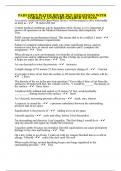
-
PADI OPEN WATER DIVER 2021 QUESTIONS WITH CORRECT ANSWERS GRADED TO PASS
- Exam (elaborations) • 17 pages • 2024
- Available in package deal
-
- $12.49
- + learn more
As a newly certified PADI Open Water Diver, I will be trained to dive with buddy as deep as - 18 meters/60 feet Certain medical conditions can be hazardous while diving, so it is important to answer all questions on the Medical Statement honestly and completely - True PADI courses are performance-based. This means that to be certified, I must - meet specific performance requirements Failure to complete independent study can create significant delays, and my instructor may have ...
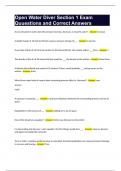
-
Open Water Diver Section 1 Exam Quuestions and Correct Answers
- Exam (elaborations) • 7 pages • 2024
- Available in package deal
-
- $13.49
- + learn more
Open Water Diver Section 1 Exam Quuestions and Correct Answers As you descend in water does the pressure increase, decrease, or stay the same? - Answer: increase A depth change of 10 metres/33 feet causes a pressure change of___ - Answer: 1 bar/ata If you take 6 litres of air from the surface to 20 metres/66 feet, the volume will be ___ litres - Answer: 2 The density of the air at 20 metres/66 feet would be ___ the density at the surface - Answer: three times A balloon fully infla...
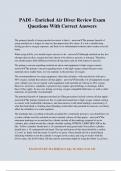
-
PADI - Enriched Air Diver Review Exam Questions With Correct Answers
- Exam (elaborations) • 6 pages • 2024
-
- $11.49
- + learn more
PADI - Enriched Air Diver Review Exam Questions With Correct Answers The primary benefit of using enriched air nitrox is that it - answerThe primary benefit of using enriched air is longer no stop (no decompression) dive times. It is not a suitable deep diving gas due to oxygen exposure, and there is no substantiated evidence that it makes you feel better. When using EANx, you should expect narcosis to be - answerAlthough enriched air has less nitrogen than air does, oxygen has been shown...
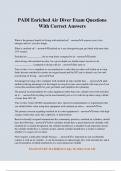
-
PADI Enriched Air Diver Exam Questions With Correct Answers
- Exam (elaborations) • 4 pages • 2024
-
- $10.49
- + learn more
PADI Enriched Air Diver Exam Questions With Correct Answers What is the primary benefit of diving with enriched air? - answerit exposes you to less nitrogen and let's you dive longer What is enriched air? - answerEnriched air is any nitrogen/oxygen gas blend with more than 21% oxygen. Enriched air ____________ the no stop limits compared to air - answerExtends when diving with enriched air nitro, for a given depth you should expect narcosis to be _______________ compared to diving with ...
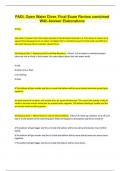
-
PADI, Open Water Diver, Final Exam Review combined With Answer Elaborations
- Exam (elaborations) • 27 pages • 2023
-
- $19.49
- + learn more
PADI, Open Water Diver, Final Exam Review combined With Answer Elaborations D float. Salt water is heavier than fresh water because it has dissolved minerals in it. This means it causes more upward force (buoyancy) on an object. An object that is neutrally buoyant in fresh water would float in salt water because there is greater upward force. See Being a Diver I - Buoyancy and Controlling Buoyancy. Ans 1) If an object is neutrally buoyant (does not sink or float) in fresh water, the same ...
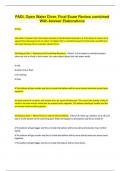
-
PADI, Open Water Diver, Final Exam Review combined With Answer ElaborationsPADI, Open Water Diver, Final Exam Review combined With Answer Elaborations D float. Salt water is heavier than fresh water because it has dissolved minerals in it. This means it c
- Exam (elaborations) • 27 pages • 2023
-
- $17.49
- + learn more
PADI, Open Water Diver, Final Exam Review combined With Answer Elaborations D float. Salt water is heavier than fresh water because it has dissolved minerals in it. This means it causes more upward force (buoyancy) on an object. An object that is neutrally buoyant in fresh water would float in salt water because there is greater upward force. See Being a Diver I - Buoyancy and Controlling Buoyancy. Ans 1) If an object is neutrally buoyant (does not sink or float) in fresh water, the same ...
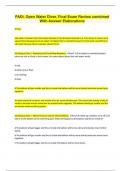
-
PADI, Open Water Diver, Final Exam Review combined With Answer Elaborations
- Exam (elaborations) • 27 pages • 2024
-
- $15.49
- + learn more
PADI, Open Water Diver, Final Exam Review combined With Answer Elaborations D float. Salt water is heavier than fresh water because it has dissolved minerals in it. This means it causes more upward force (buoyancy) on an object. An object that is neutrally buoyant in fresh water would float in salt water because there is greater upward force. See Being a Diver I - Buoyancy and Controlling Buoyancy. Ans 1) If an object is neutrally buoyant (does not sink or float) in fresh water, the same ...
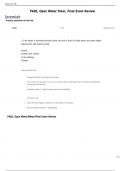
-
PADI, Open Water Diver, Final Exam Review Practice questions for this set Learn 1 / 7 Study with Learn 1) If an object is neutrally buoyant (does not sink or float) in fresh water, the same object placed into salt water would A sink. B either sink
- Exam (elaborations) • 15 pages • 2024
- Available in package deal
-
- $7.29
- + learn more
PADI, Open Water Diver, Final Exam Review Practice questions for this set Learn 1 / 7 Study with Learn 1) If an object is neutrally buoyant (does not sink or float) in fresh water, the same object placed into salt water would A sink. B either sink or float. C do nothing. D float. Choose matching term A become half the size it was at the surface. At 10 meters, the pressure is 2 bar. An air volume taken to this depth from the surface would decrease 1 and be...

Study stress? For sellers on Stuvia, these are actually golden times. KA-CHING! Earn from your study resources too and start uploading now. Discover all about earning on Stuvia


